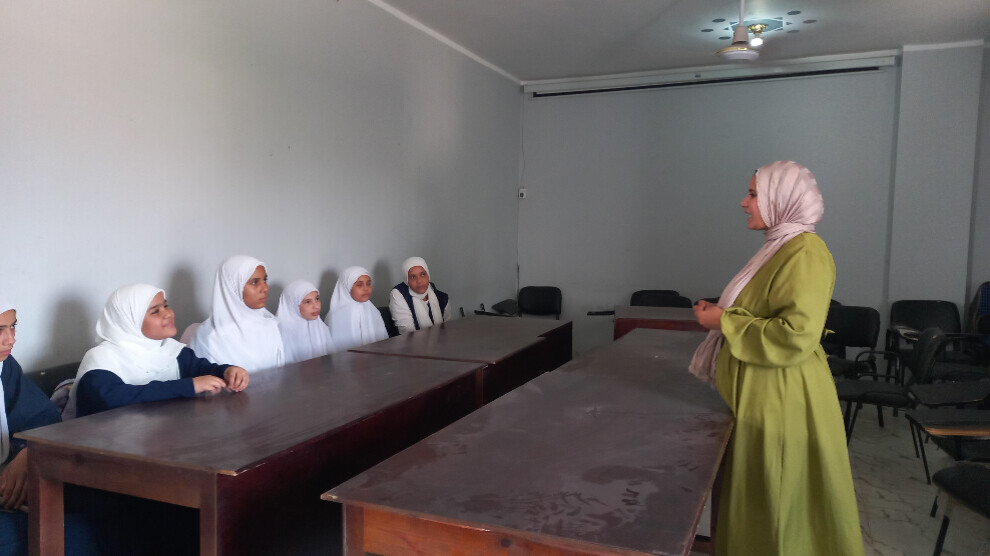From the Pain of Circumcision to a Voice That Refuses Silence
Aya Mostafa transformed from a victim of female genital mutilation (FGM) into an activist fighting to protect girls - spreading awareness and confronting harmful traditions with courage and determination.

Iman Samir Ali
Egypt - Aya Mostafa, a 24-year-old from the village of Dakran in Assiut, lived through a painful experience that left an invisible wound, one that continued to bleed within her for years. At the age of eleven, she underwent circumcision. Though time passed, she never forgot that day. Instead, she decided to turn her pain into strength and her silence into a voice that protects others from the same fate.
Aya, a graduate of the Faculty of Education, Physics Department, recalls: “I still remember every moment of that cursed day. I was eleven, fully aware of what was happening. Because of that trauma, I decided that I would never let another girl go through what I did.”
When a project called “Energy of Light” was launched - focusing on raising awareness about FGM and its dangers as a crime unrelated to any divine religion - Aya decided to join.
“At first, I was scared,” she admits. “It was difficult to even talk about the subject. I couldn’t imagine accepting that what we grew up believing was actually wrong. We inherited the idea that circumcision is a natural and essential tradition, and that girls who aren’t circumcised will face problems later in life.
After joining the project, Aya gradually overcame her fear and began learning more about the issue.
“I worked with the team, learned about the laws that criminalize FGM and the penalties for parents or doctors who perform it. I also learned the true religious ruling and discovered that the sayings people use to justify FGM are false and have no authentic source.”
She began going to villages to educate girls and mothers.
“I held sessions for girls aged 10 to 15, explaining what FGM really is and clarifying that it’s not purification - it’s mutilation of the female genital organs.”
Aya faced many challenges. Some mothers accused her and her team of encouraging their daughters to rebel or behave immorally.
“But through repeated sessions and by explaining the serious physical and psychological harm caused by FGM, some mothers were eventually convinced and changed their minds,” she said.
“In some cases, when we learned that a circumcision was scheduled, we would immediately notify the Child Helpline, and they would take swift action to prevent it.”
Aya’s activism didn’t stop with her work in the project - it extended to her own family as well. “My older sisters were circumcised, but we decided to protect our youngest sister, who was 12, from that pain. We spoke to our parents - they refused at first, but we insisted and explained the harm we had suffered. Eventually, they listened and agreed not to circumcise her.”
At the end of our conversation, Aya offered a message to girls everywhere:
“I encourage every girl to have a voice, to speak up for herself, to reject anything that harms her physically or emotionally, and never to accept it under any justification.”
Decline in Female Genital Mutilation Rates
Assiut is one of the Egyptian cities with the highest rates of FGM. A 2015 UNICEF study comparing several Egyptian cities - including Cairo, Alexandria, and Upper Egypt - revealed that 94% of girls aged 13–17 in Assiut had undergone circumcision, compared to 65% in Cairo and 39% in Alexandria.
In June 2025, Egypt’s Minister of Social Solidarity, Dr. Maya Morsy, announced that the percentage of girls aged 15–17 who had undergone FGM dropped from 61% in 2014 to 37% in 2021. She also noted a significant decline in support for the practice - from 75% of women in 2000 to 30% in 2021.
Despite progress, estimates indicate that seven million girls in Egypt between 2015 and 2030 remain at risk of FGM. Dr. Morsy stressed the need to accelerate efforts fifteenfold to meet the 2030 global goal of eradicating the practice entirely.
In the same context, the National Committee for the Eradication of FGM, in cooperation with the National Council for Childhood and Motherhood and the National Council for Women, announced the prevention of an attempted circumcision of seven girls in Assiut and one case in Sohag in July 2025.
Dr. Sahar El-Sonbati, Head of the National Council for Childhood and Motherhood, explained that the Child Helpline (16000) received a report that the girls - cousins aged 10 to 12, residing in Abnoub, Assiut - were about to undergo FGM.
“The Public Prosecution immediately launched an investigation,” she said. “The families were arrested before the operation took place, and they were made to sign pledges not to endanger the children or proceed with the crime.”
